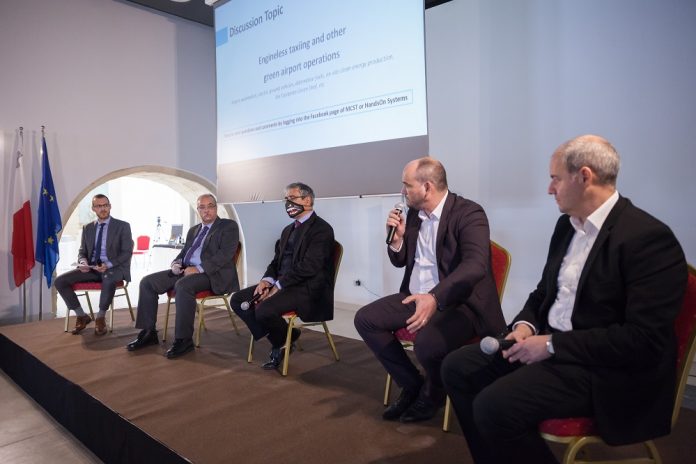Minister for Research, Innovation and the Co-ordination of Post Covid-19 Strategy Owen Bonnici participated during a SATMET event at Esplora together with Malta Council for Science and Technology Chairperson Jeffrey Pullicino Orlando.
The aviation industry is being driven to adopt more sustainable and environmentally-friendly technologies for all phases of flight, including ground operations. Currently, in most airports around the world, aircraft use one or more of their main engines to move from the gate to the runway or vice-versa. This is very inefficient, especially at large airports such as Heathrow and Frankfurt, where taxi times greater than 20 minutes are normal.
One of the solutions that is being proposed to address this problem is to use electric tow trucks to tow aircraft between the gate and the runway. This means that the aircraft’s engines can remain off during taxiing, thus reducing emissions, noise, brake wear and maintenance costs.
Minister Owen Bonnici explained how: “The SATMET project developed an innovative solution for engineless taxiing based on the use of autonomous (driverless) tow trucks. This approach presented the researchers of the project with a number of technical and operational challenges. The first key challenge was to keep the tow trucks ‘aware’ of their surroundings. This is necessary to ensure that the tow trucks can navigate on their own and tow aircraft safely in an airport environment. The second main challenge was to manage a fleet of tow trucks. The tow trucks need to be managed in an efficient manner to minimise delays and prevent traffic conflicts. Furthermore, it is important that air traffic controllers are kept in the loop at all times.”
Minister Bonnici congratulated the project lead entity, as well as their partners for the progress in a project that is shortly coming to a successful end. “Investment in Research and Innovationto generate economic wealth,” continued Minister Bonnici, “as well as the formation of consortia between public and private entities are of utmost importance. Transfer achieved in both directions within a consortium, is crucial to concretising research to deliver solutions to challenges faced not only within science, but within economic growth and competitive impact.”
MCST’s role in strengthening the Research and Innovation pillar in Malta is of notable success as in the last 5 years under FUSION, around 116 Commercialisation Voucher Programme (CVP) projects were awarded and 48 Technology Development Programme (TDP) projects. Over the last 5 years, MCST has administered some €11 million for such projects under CVP and TDP, with one of the beneficiaries in fact being the SATMET project which was awarded €194,000.
The Ministry for Research, Innovation and the Co-ordination of post Covid-19 Strategy recognises the importance of the R&I pillar within Malta’s economy and is committed to supporting this direction. The project being promoted has successfully achieved its promised deliverables and has made notable steps in advancing the relevant technologies they have researched. The project has been a multi-disciplinary one, involving industrial expertise in manufacturing and academic researchers.
This project funded by MCST under the FUSION National R&I Programme with a grant value of €194,000.










